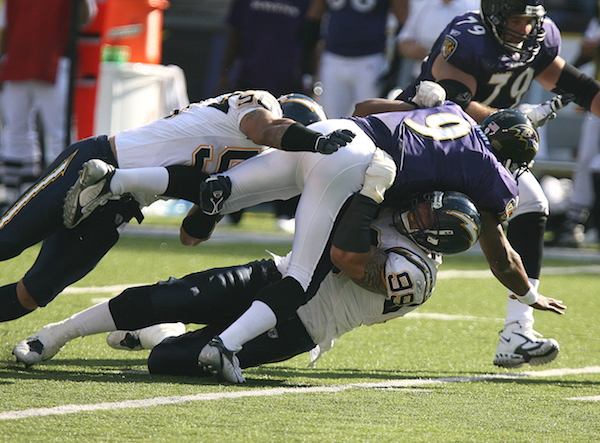Dear Sports Fan,
I’ve been watching a bunch of football so far this season. I’m enjoying it and learning to. I do have one question — I’m confused about where the offense gets to start their next play from? I thought it was where the person with the ball’s knee hits the ground. Sometimes it seems like they start much farther down the field. This is sometimes accompanied by the announcer saying something about forward progress. What does forward progress mean in NFL football?
Thanks,
Joel
Dear Joel,
You’re absolutely right. Most of the time in football, when a player is tackled with the ball, their team’s offense starts their next play from the spot (end zone to end zone, not side to side) where the ball was when their knee or butt hit the ground. There are a few exceptions to this rule. Some may be obvious but easy to forget, like what happens when the offensive team scores a touchdown (they get to attempt an extra-point field goal from the 15 yard line or a two point conversion from the 2 yard line), what happens when a team fails to earn a new set of downs on a fourth down play (the other team gets the ball), or what happens when a player goes out-of-bounds (their team gets the ball wherever it was when they first touch the ground out-of-bounds with any part of their body). Another exception is what happens when a player, usually a quarterback, slides feet first. By far the most confusing exception is the one you’ve identified – the rule of forward progress.
The best way to explain forward progress is to start with a fairly absurd scenario. Suppose an offensive player is running with the ball. He gets surrounded by a group of defensive players converging on him. These defensive players wrap their arms around him to stop him from moving forwards. Then, moving in unison, they pick him up in the air and begin to carry him down the field. They eventually deposit him onto the ground in his own end-zone, where his being tackled with the ball earns the defensive team a safety and two points. The forward progress rule addresses and prevents this scenario by declaring the play to be over as soon as an offensive player who is running with the ball has his movement down the field stopped by an opponent. If the play is over as soon as forward movement ends, then what happens afterwards, often the offensive player falling or being pushed backward is no longer relevant to the game.
There is an element of judgement to this call. Each ref must decide for herself when a player’s forward movement is conclusively stopped. Most give the benefit of the doubt to the offensive player. Given how insanely athletic football players are, this makes sense. What would once and for all stop your or my forward progress (and potentially our lives) may be a momentary setback to an NFL running back or wide receiver. Generally, because of this, the way that refs actually enforce this rule is that as long as a ball-carriers legs are still moving in some facsimile of an attempt to run, they are allowed to continue to play, even if they are forced backwards. As long as this is true, refs will give the play a little bit of time to play out, almost like an advantage call in soccer. If the offensive player ends up getting tackled to the ground without ever being able to start moving forward again, the ref gives their team the ball where they originally stopped moving forward. If the offensive player is able to break out of the grasp of the defender and runs forward, the play continues until he is tackled or has his forward progress stopped again.
Like many rules in football, the enforcement of this rule is a balance between ensuring the safety of the players — the faster a ref stops a play, the less likely it is for players to get hurt struggling for an extra yard — and allowing potentially amazing and entertaining feats to happen. For an example of that, check out this run by Dallas Cowboys running back Marion Barber. Watch how he’s able to keep his legs running and therefore the play going as he’s forced backwards several times:
Thanks for reading,
Ezra Fischer

